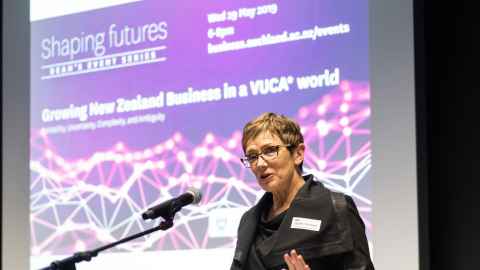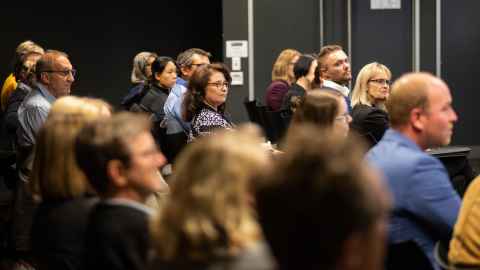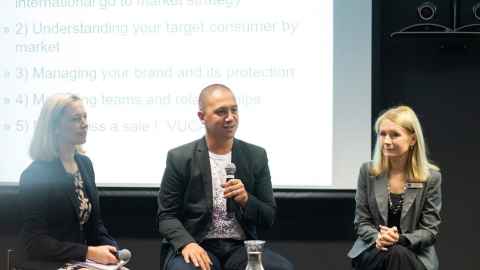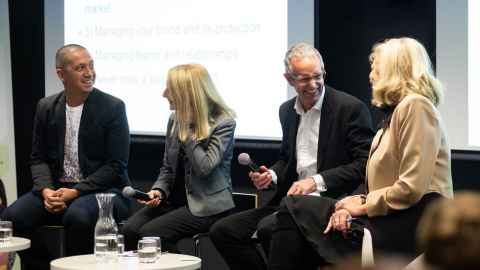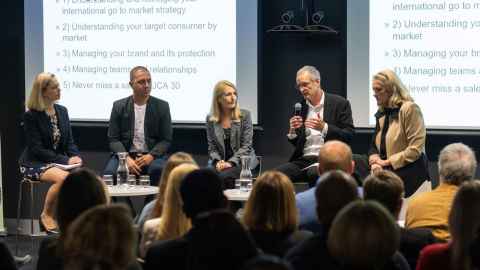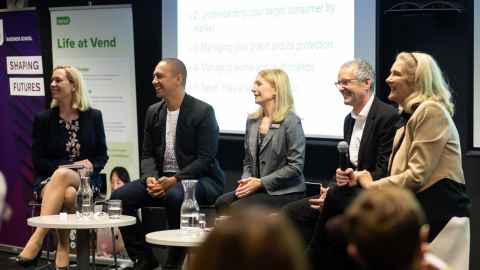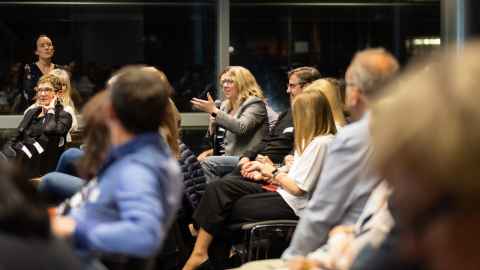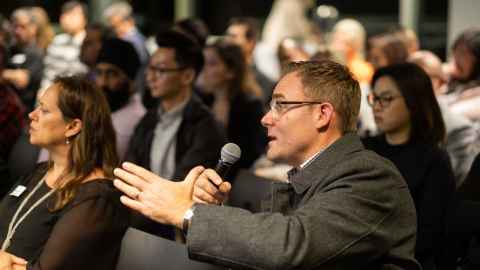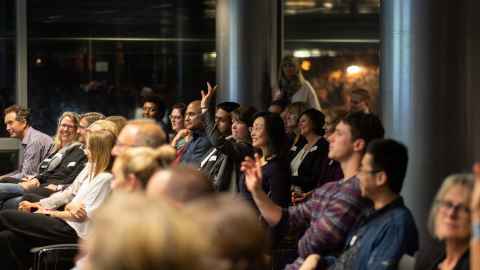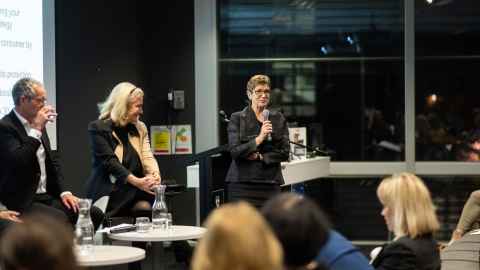Growing New Zealand Business in a VUCA* World
08 February 2023
The first event in the Business School’s Shaping Futures Series explored how New Zealand businesses can achieve international success in times of rapid change and disruption.
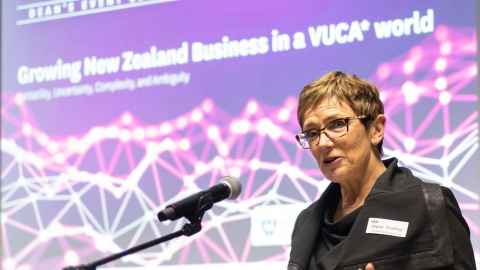
For the first of the Business School’s Shaping Futures Series, Dean of the Business School, Professor Jayne Godfrey was joined by leading academics, alumni and representatives from New Zealand businesses and government to explore how New Zealand businesses can achieve international success in times of rapid change and disruption.
One of the Business School’s four strategic research and education themes is succeeding in international markets and a crucial part of our mission is to advance New Zealand business.
“We know that New Zealand has a small population: with such a small population it's essential that our businesses have global aspirations. However, with the global environment as it is, how can our home-grown enterprises successfully expand into overseas markets? The first in our Shaping Futures Series brings us together to discuss the challenges facing New Zealand business.” Says Professor Godfrey.
*Volatility, uncertainty, complexity and ambiguity.
Keynote speaker
Sarah Kennedy, Business School alumna and adviser, and CEO of Lifestream International (NZ) Ltd and Calocurb Ltd, shared her recent experience of launching her latest venture, Calocurb, in New Zealand, China and the US. She shared the themes that she believes remained constant in a rapidly changing world.
- When you get an opportunity to sell, always sell your product
- Understand your target market by consumer and manage your international growth strategy
"Where is my target market? How do I want to approach it with my international growth? Have an understanding from the beginning of what you want to do with your international growth."
- Manage your brand and its protection
"We put a lot of effort and resource into getting the right brand positioning, brand pillars and narrative and testing those. Having well thought-out and clearly articulated branding has been essential for our discussions with offshore partners. We've trademark Calocurb in our key countries. This is necessary if you want to protect your brand and maximise its value in the long-term."
- Manage relationships
"Calocurb has a large and virtual team, so relationships are critical. You need to keep the communication and dialogue up: culture is even more important in a virtual team. New Zealand Trade and Enterprise also provided incredible assistance in New Zealand and internationally: their knowledge of the market and their networks are invaluable. Forming these relationships that you can leverage off, the networks and the knowledge of the market that NZTE have are invaluable."
Our panel
Sarah joined our other panel members Alex Fala (CEO, Vend), Craig Armstrong (Director – Customers, New Zealand Trade and Enterprise), Dr Antje Fiedler, (Senior Lecturer, University of Auckland Business School) and Associate Professor Maureen Benson-Rea, (Associate Professor and Associate Dean – Postgraduate, University of Auckland Business School) to share their insights on Growing New Zealand Business in a VUCA World.
Key highlights from our wide-ranging panel discussion
On what is changing in today's environment and what is staying largely constant
Craig: The market leader position nowadays is very defensive and they are not going to innovate. From New Zealand, it’s going to be the challenger brands, the innovators, the people that are prepared to take some risks and do things differently that drive the disruption and increase complexity into some market categories.
Alex: The messaging around understanding your customer is absolutely true and remains the same. The thing that has changed is how much easier it is to try things now. Because our entire product was delivered and marketed on the internet, that means you can experiment easily with both channels and messages.
Antje: What has changed is that we have rich experiences here in New Zealand. There are two factors. 1. More and more visitors are coming to see New Zealand and they know our story and they become advocates for New Zealand. 2. At the Business School we have a lot of international students. That's an awesome opportunity because they're educated here: we can hire people from different markets, use their language and cultural capability, expand our network and be successful through them.
On bringing back and keeping value in New Zealand when you are operating in international markets with virtual international teams
Sarah: For us it bringing the money back to New Zealand and reinvesting in science in New Zealand. It's not always about creating jobs here. We have partners all over the world, where we can use them in New Zealand, we will, but we also recognise that influencer agencies are far more connected in the markets they are in.
Alex: When we think about the impact on New Zealand, we do have to think a bit more broader than just a specific company at a specific time, and we need to consider second and third order effect. A great example is the tech industry: there are tons of companies doing really well and they are all hiring a lot of people. We are all competing for each other’s people and it's just part of the ecosystem that we're building now and that's going to be really healthy going forward.
On how you lead a team through difficult times and be resilient
Sarah: As you grow older and you've been through a number of companies, a number of countries and a number of other things, your resilience actually grows.
Antje: We learned from our research that for many small firms, if they make a failure, they could lose their business. I think it's really good to keep that in mind and think about affordable loss. The European companies are much bigger, they can make mistakes and they can recover. But we have seen too many New Zealand smaller firms not do that. So I think to keep that figure in mind: then if everything goes wrong, you can survive it.
Alex: When you're hiring you're trying to put your best foot forward, particularly when you are trying to bring world-class executives on board. But we're also trying to make sure we're screening for the right kind of people, and resilience is one of those things.
Craig: There is a responsibility for us all as leaders. If we're not creating a culture of curiosity, a culture of empathy or emotional intelligence, allowing people to challenge us and our thinking, then we’re actually going to hold the businesses and the people back that we're working with. If there was one thing that allows us to navigate this with certainty, it’s great leadership. The Business School has been looking at this with global mindsets and growth mindsets for a long time and we should be embracing that.
On the skills and capabilities needed to navigate the VUCA world
Alex: The biggest challenge is that things are always changing and there's tons of opportunity to learn, but everybody else is doing it too. A lot of what you get from a university education is actually learning how to think. For me, any time I'm not actively working or actively socialising, I'm probably trying to learn.
Craig: The important skill that we've been asked about, that most businesses that we're dealing with are we're looking for, is people that have the ability to understand and process data. That’s the skill at the moment that we just can’t see in New Zealand.
On how important a thriving manufacturing industry is to New Zealand
Craig: We need thriving high-value manufacturing businesses here. But it depends on the channel to market: it depends on the consumer's understanding of who you are. And it depends on the cost.
Antje: Manufacturing is important because it creates good jobs. We have seen a lot of companies who can't manufacture in New Zealand because we don't have the suppliers. Companies would prefer to manufacture here but it's not always possible: it’s not always cost-effective because we're so small.
On risk planning for unfolding geopolitical complexities
Sarah: Where it affects us in the longer term with geopolitical tensions is where people don't spend money on more luxury goods. So I could see that possibly happening in the UK with Brexit.
Craig: There will always be the risk that you haven't thought of that gets you. So I think that you go back to your company culture and your leadership and you say “how well placed are we to respond to the seismic event that's going to hit us?” It doesn't need to be geopolitical, it could be regulatory, a shift in consumer intent or a power failure.
On future disruptions and trends in international business
Alex: Technology does keep changing and it keeps getting more powerful. For us, actually learning how to make great use of the data that we have is going to be critical going forward. I think that's the case in many businesses. If you're not, others are going to do that, so you have to be super smart about using that, and technology enables you to do that.
Antje: You do have sceptical consumers these days. Consumer who really dig deep and they will really challenge your company. Are you sustainable? What are your values? What is your story? Is your story true? I think this is also a challenge for firms. With the internet, you could have an explosion of comments about your company overnight and you have to think how do we deal with that?
